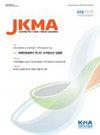Therapeutic approach to atopic dermatitis in children
IF 0.5
Q3 MEDICINE, GENERAL & INTERNAL
引用次数: 0
Abstract
Background: Atopic dermatitis, a chronic inflammatory skin disease can significantly reduce patients’ quality of life. It is commonly observed in infants or young children but can also occur in adults. Patients with atopic dermatitis are at risk of developing food allergies, allergic rhinitis, and asthma.Current Concepts: Treatment of atopic dermatitis should commence with moisturization of epidermal skin and avoidance of environmental factors that may trigger exacerbation of atopic dermatitis. Topical corticosteroid application remains the gold standard for medical management of atopic dermatitis; however, topical corticosteroids are often avoided owing to concerns regarding the adverse effects of these drugs. Recently, several systemic immunosuppressants and biological agents have been introduced for the treatment of atopic dermatitis. These medications are associated with fewer adverse effects than those observed with previous treatments and have therefore shown positive results for successful management of atopic dermatitis.Discussion and Conclusion: It is expected that new drugs tailored to the disease level of each patient will revolutionize the treatment of atopic dermatitis more effectively in future.儿童特应性皮炎的治疗方法
背景:特应性皮炎是一种慢性炎症性皮肤病,可显著降低患者的生活质量。它常见于婴儿或幼儿,但也可发生在成人。特应性皮炎患者有发生食物过敏、过敏性鼻炎和哮喘的风险。当前观念:特应性皮炎的治疗应从表皮皮肤保湿开始,并避免可能引发特应性皮炎恶化的环境因素。局部皮质类固醇应用仍然是医疗管理特应性皮炎的金标准;然而,由于担心这些药物的不良反应,通常避免局部使用皮质类固醇。近年来,一些全身免疫抑制剂和生物制剂已被介绍用于治疗特应性皮炎。与以前的治疗相比,这些药物的副作用更少,因此在成功治疗特应性皮炎方面显示出积极的结果。讨论与结论:预计未来针对每个患者的疾病水平量身定制的新药将更有效地革新特应性皮炎的治疗。
本文章由计算机程序翻译,如有差异,请以英文原文为准。
求助全文
约1分钟内获得全文
求助全文
来源期刊

Journal of The Korean Medical Association
Medicine-General Medicine
CiteScore
0.50
自引率
0.00%
发文量
84
审稿时长
4-8 weeks
期刊介绍:
The Journal of the Korean Medical Association (JKMA) is the official peer-reviewed, open-access, monthly journal of the Korean Medical Association (KMA). It contains articles in Korean or English. Its abbreviated title is ''J Korean Med Assoc''. The aims of the Journal include contributing to the treatment of and preventing diseases of public health importance and to improvement of health and quality of life through sharing the state-of the-art scientific information on medicine by the members of KMA and other national and international societies.
 求助内容:
求助内容: 应助结果提醒方式:
应助结果提醒方式:


